Morocco is certainly a scenic country in the Maghreb, with some of the most progressive tourist numbers, with the most popular destinations being Marrakesh, Casablanca, Fes and Chefchaouen.
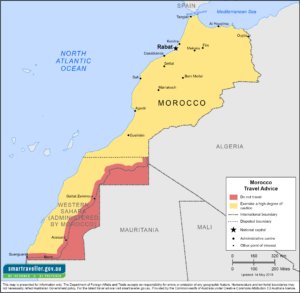
Map of Morocco showing the main territories -Morocco and Western Sahara.
Morocco had previously been a French protectorate, and after the capitulation of France to the Nazis in 1940, the collaborative Vichy Government allowed Moroccan ports to be controlled by the Germans until the North African campaign in 1942 liberated it.
In fact, the 1942 Warner Bros movie classic Casablanca, featuring Humphrey Bogart, is based on this exact same situation.

Academy award winning movie Casablanca, based on the country Morocco.
Ironically, Morocco is ranked the 4th poorest Nation among those in the Arab World, only slightly exceeding Mauritania, Sudan and Yemen.
The IMF estimates that Morocco is the 15th ranked in Africa and 126th ranked globally, based on GDP per capita of approximately $3,137. This is behind that of Algeria ($4,034), Tunisia (3,465) or even South Africa ($6,180).
If you are wondering, so are we, how an average country has brewed such high aspirations that it targets most sports and in particular football to drive its agenda, coupled with such huge disruptive capacity.
When the 55-year old Moroccan King Mohammed VI took the reins of power after the death of his father Hassan II in 1999, he was probably determined not to make the mistakes of his father and to lead his country down a different path.
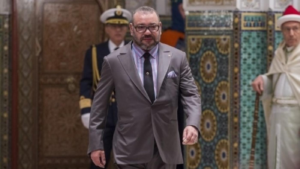
55-year old King Mohammed VI who has been at the helm since 1999.
His father’s 38-year autocratic rule had made matters on the continental front a bit difficult for Morocco.
The first such collision came in the wake of the Organisation of African Unity (OAU), the precursor to the current African Union (AU) had in1984 recognized the independence and autonomy of Western Sahara, a country annexed (colonized) by Morocco.
King Hassan II and Morocco walked out of the OAU in huff.
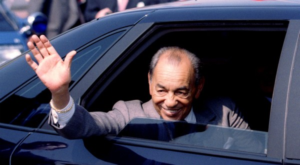
The late King Hassan II, former King of Morocco and father to current King Mohammed VI.
The 70s and 80s were extremely sensitive times in Africa where matters of independence and sovereignty were concerned. In fact 28 African countries had boycotted the Montreal Olympics in 1976 to protest the New Zealand All Blacks Rugby tour of South Africa, a country that had effectively been under IOC embargo since 1968, due to the Government stance on Apartheid.
King Hassan II went further to express his displeasure at the OAU by formally and publicly applying to the present day European Union (EU) for admission of Morocco in 1987.
Obviously the application was rejected on Geographical basis. However, Morocco has since then leveraged its proximity to Europe to drive its economy powerfully.
And so, the young King has worked quietly to rebuild some of those bridges that were burnt by his father, efforts which eventually got Morocco re-admitted into the AU in 2017 despite the unresolved issue of Western Sahara.
King Mohammed VI has apparently adopted a new credo when dealing with Sub-Saharan Africans – they all have a price!
You can actually see this during his interactions with Presidents of independent African republics at the AU, with their unapologetic fawning at him, and who would gladly suffer continued colonialism in Western Sahara, rather than rock the boat demanding for the resolution of this issue as a precondition for re-admission.
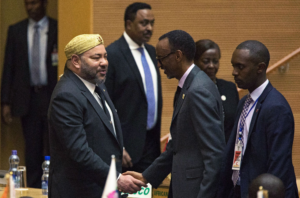
King Mohammed VI welcomed back into the AU by Chiairman Paul Kagame despite questions over annexation of Western Sahara.
In the sports realm, Morocco has shown an appetite for hosting premier events with very ambitious moves to snap up the hosting of any continental or global sports event, beginning with its unsuccessful bid to host the FIFA World Cup 2026.
Morocco will be hosting the 12th African Games (previously All Africa Games) later this month in Rabat.
In 2018, Cameroon who had previously won the hosting rights to the 2019 Africa Cup of Nations (AFCON) accused Morocco of working behind the scenes to ensure that their hosting agreement with CAF was withdrawn for unpreparedness, and Morocco act as the replacement host.
The hosting of an AFCON would have been a dry-run for the potential hosting of FIFA World Cup and a powerful platform to showcase its preparedness to the naysayers at FIFA, whose own internal report had called into question Moroccan ability to have infrastructure ready for the 2026 World Cup.
Morocco had shown its ambitions of hosting such events when they replaced Kenya as the hosts of the 2018 African Nations Championship (CHAN) which is a 2nd tier football competition after the flagship AFCON.
Huge money and strong Governmental backing are the two common threads that seem to follow any Moroccan forays into sports-related endeavors, which in turn has made Moroccan sports officials extremely powerful within African sports confederations.
When Gianni Infantino met with current CAF President Ahmad Ahmad in 13th November 2015 at the Stade Municipal De Mahamasina in Antananarivo, Madagascar in the presence of current FIFA Secretary-General Fatma Samoura, he had a unique set of problems.
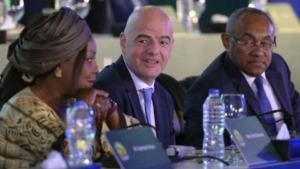
The current downward spiral at CAF began with the meeting between these leaders in Madagascar on 13th November 2015.
First, his main opponent Prince Salman of Bahrain was Muslim and therefore able by default to mop up the votes from Islamic Nations and Muslim FA Presidents, who made a critical voting mass at the FIFA Congress.
Infantino therefore needed a silent swing vote, which he believed that could be found in Africa.
Secondly, the campaign war chest that his Bahraini opponent was operating was unprecedented in a FIFA Presidential campaign and Infantino had no such reserves to go toe-to-toe against Prince Salman.
He was however, assured of the 50+ from UEFA where he had until then served as Secretary-General plus several other confederations with whom he had good rapport.
The African FAs however, would need to be wooed with both words and liberal amounts of cash. To wit, most African FA Presidents needed their votes to be purchased outright by the highest bidder, and in many cases they were known to take money from several candidates, but vote for the one who offered the highest amount to them.
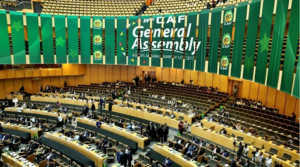
CAF General Assembly: FA Presidents in this African jungle are not interested in football development in their regions, but just to sell their votes and pilfer FIFA Grants.
Thirdly, Infantino knew that the then CAF President Issa Hayatou likely hated his guts and would marshal the CAF FA Presidents against him at the February 26th 2016 FIFA Congress. To make matters worse, Hayatou was now the acting FIFA President and he was inclined to Prince Salman from the get-go.
And during this visit to Madagascar in the fall of 2015, a vulnerable Infantino spilt his guts to Ahmad and his lover cum business partner, Fatma Samoura. With nothing to lose, this trio entered into a pact where they would help Infantino rise to FIFA Presidency and his first act would be to appoint Fatma Samoura to the position of FIFA SG.
Ahmad knew he needed money to purchase the loyalty of the African FA Presidents and to be able to stoke the silently growing disaffection against Issa Hayatou.
He therefore approached a bright young man, who was also the President of the Royal Moroccan Football Federation (FRMF) by the name Fouzi Lekjaa, and who appeared to be the darling of the Moroccan Royal house and its King Mohammed VI.
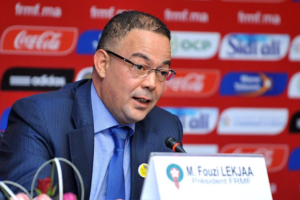
Moroccan FA President and CAF 2nd VP Fouzi Lekjaa who has amassed immense power in a short time in the organization.
Whilst Fouzi had access to the money required to assist Infantino win the FIFA Presidency, like any good businessman he needed it underwritten in some way.
Ahmad had already negotiated 2 deals in the event that Infantino achieved this feat, one was for Fatma Samoura to be appointed FIFA SG and the other was for Infantino to throw his weight behind him when he went for the CAF Presidency, in a year and a half’s time.
Fouzi Lekjaa was not interested in these small-time capers that would likely not interest his King, Mohammed VI. His preference was firmly skewed towards Morocco taking a stab at a FIFA World Cup bid, preferably the next available one in 2026.
The expanded agreement therefore became that should Infantino win the CAF Presidency in 2016, he would use his position to influence the selection of Morocco in 2018 as the hosts of the 2026 FIFA World Cup.
Meanwhile, Issa Hayatou was pretty confident that he had everything at hand, and that his iron grip on the CAF FA Presidents was absolute. Ahmad and Fouzi immediately went to work on the fringe FA Presidents, beginning with CAFs soft underbelly – the Muslim FA Presidents.
The Ahmad-Lekjaa duo intentionally bypassed the known Hayatou loyalists like DRCs Constant Omari, Guinean Almamy Kabele and Beninois Anjorin Mocherafou.
Instead they focused on the small, insignificant football voters from the islands and the hinterland – Like Mauritius, Cape Verde, Mauritania, Libya, Chad, Eswatini, Eritrea, Djibouti, Equitorial Guinea, South Sudan, Uganda, Sierra Leone et al. These FA’s would later form the cluster of swing votes which elected Gianni Infantino, plus of course the grand prize of CAF Presidency for Ahmad Ahmad.
During the FIFA Congress in Zurich on 26th February 2016, Ahmad-Lekjaa perfected the art of the 2nd round vote with their African supporters.
This involved convincing their allies to vote randomly in the first round, when there were more than 2 candidates on the ballot, thereby forcing the contest into a run-off, where they would then amass their swing votes behind their preferred candidate in a veritable coup de grâce.
In the first round of voting, the results were Infantino (88), Prince Salman (85) and Prince Ali Hussein (27).
During the 2nd round of voting, the results were Infantino (115), Prince Salman (88) and Prince Ali Hussein (4) which seemed to indicate that voters had decamped from Prince Ali Hussein in droves, preferring Infantino to Prince Salman.
7 new swing votes were discreetly injected into the 2nd round, in favor of Infantino, which voters had not participated in the 1stround of voting.
Infantino learnt this lesson very well, and in order to mitigate against the duplicity of the mainly African FA Presidents during the congress vote for the hosts of the 2026 FIFA World Cup, he amended the rule to ensure that the vote was done and tallied publicly.
Apparently Hayatou fell for the ruse, completely blind to the fact that the Infantino win was engineered by his own crafty African voters and members of his CAF Exco.
So oblivious was he to the vicissitudes of the politics, that he walked right into an Ahmad ambush during the CAF Presidential elections of March 2017, where he was defeated resoundingly.
Just like Moroccan Fouzi Lekjaa had financed the Africa campaign of the Infantino election in 2015 -2016, we will revisit the issue of the campaign promises made to Fouzi Lekjaa and King Mohammed VI by Infantino, in subsequent articles.
However due to the stringent ethical barriers which FIFA have imposed following the numerous scandals which threatened to rip it apart, Gianni has refrained from directly bribing the electoral college in Africa but has found a loophole to manage the situation.
Prior to the 2016 FIFA elections, Morocco had signed close to 15 cooperation agreements with various Football Associations in Africa. These phantom agreements promised countries technical, logistical and financial support in developing lasting football programs, with the able assistance of Morocco, which in itself is not a football powerhouse of any repute.
A pattern can be drawn between the cooperation agreements signed by Morocco FA President Fouzi Lekjaa and the swing vote which got Gianni Infantino elected in 2016. Apparently when Ahmad first met Gianni Infantino in Antananarivo in November 2015, they both reached out to Morocco FA supremo Fouzi Lekjaa encouraging him to continue signing the phantom cooperation agreements, which would covertly act as a campaign logistical architecture by ensuring there is no link between Gianni directly and the FA Presidents.
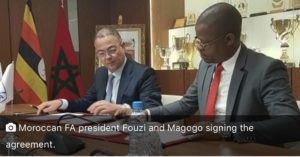
Morocco FA President Fouzi Lekjaa signing a cooperation agreement with Uganda FA President Moses Magogo in 2016. To date, 40 of similar “cooperation agreements” have been signed between Morocco FA and various FA’s in Africa and Middle East.
How was the money going to be repaid? Well FIFA has been conspicuously wiring money to CAF in which they used the pretext to send auditors in April. That slush fund which doesn’t appear in CAF books and not substantial enough to warrant an intervention of such a magnitude, is the money that Morocco FA was supposed to refund itself.
It was still Fouzi Lekjaa that Ahmad turned for the campaign kitty to help him win the 2017 CAF Presidential election against the grand old man – Issa Hayatou.
The trade-off within CAF was that Ahmad (once elected) would place Fouzi Lekjaa in charge of the finances at CAF, and that Lekjaa could use this position to refund himself (or FRMF) whatever he had spent on the electoral process to install Ahmad into the CAF Presidency.
This strange movement of cash for votes to serve both Gianni’s and Ahmad’s campaign, then answer the most important question that everyone has been asking. Why has Gianni Infantino impeded any investigations into Ahmad and continued to allow him to operate unhinged? It is these details which Ahmad is using to blackmail Gianni into toeing his line.
It is details of these particular transactions which FIFA wanted to obscure by sending forensic auditors to CAF in April of this year, to ensure that the paper trail doesn’t attract the attention of both the Adjudicatory Chamber and law enforcement from Switzerland who have been hot on the heels of Gianni Infantino, especially after his friend Michael Lauber was forced to recuse himself from cases involving FIFA.
Ahmad, by virtue of his position in the CAF Exco, was also privy to the existence of more than $150 million in the CAF reserves from the commercial arrangements CAF had with partners. This is what he traded off to underwrite his very expensive campaign against Hayatou.
It therefore came to pass that Ahmad was elected to the CAF Presidency in March 2017 to replace a shell-shocked Issa Hayatou. The election also saw Fouzi Lekjaa elected into the CAF Exco, even though this piece of news didn’t make the headlines. What was even more unique was the margin he won with. While other elections have shown some parity as to the differing ideological positions, Lekjaa won by almost near unanimity.
It was now very easy to maneuver, since CAF rules state that one has to be a member of its Exco, to be selected to Chair any of the standing committees. Ahmad also created the position of 3rd Vice-President in his Exco and elevated Fouzi Lekjaa to it, with the additional portfolio of Finance Committee Chairman.
Fouzi Lekjaa used his newfound influence to ensure that he placed his Moroccan compatriots into every critical standing committee of CAF and the CAF Secretariat in Cairo.
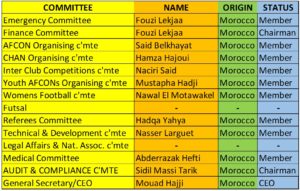
Morocco has the highest representation in CAF standing committees than any other; indicating its iron grip on decision-making.
He silently slid in a Moroccan dentist by the name Mouad Hajji into the position of CAF Deputy General Secretary, to shadow the immediate former General Secretary (GS), the Egyptian Amr Fahmy.
Either way, Amr Fahmy was eventually going to have to make way for Mouad Hajji, by fair means or foul.
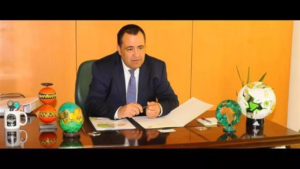
Moroccan dentist Mouad Hajji elevated to CAF GS to close the loop of dominance on the organisation by Fouzi Lekjaa.
In order to minimize any questions on the mis(use) of funds in CAF, Ahmad allowed Fouzi Lekjaa to place another Moroccan as the President of the critical Audit and Compliance committee, whose mandate would be to offer CAF a system of checks and balances, was effectively neutered, which gave both Lekjaa and Ahmad the green light to raid the reserves with wanton impunity.
However, the more we see Gianni Infantino and Fatma Samoura in the picture, both beneficiaries of the financial largesse of Moroccan Fouzi Lekjaa, it is clear that the FIFA “hostile takeover” is just a means to cover the financial tracks of the massive looting of the CAF coffers by Ahmad and Lekjaa, aided by the FIFA high command.
Could they be building a war chest for the future FIFA and CAF elections, by looting CAF coffers and covering their tracks in such an imperialistic manner?
Fouzi Lekjaa is surely the king of the roost and just to prove it, he occasionally flexes a muscle to ascertain that his puppets are all in place, where they should be. For instance, he recently compelled the entire 22-man CAF Exco (that includes members of the FIFA Council) to insert in its agenda of 5th June 2019 in Paris, his personal gripe that his home team – Wydad Casablanca – had lost to Esperance De Tunis in the 2nd leg of the CAF Champions League on a technicality.
Wydad had arrogantly abandoned the match in the 60th minute, citing a disallowed goal and the lack of VAR Technology to ascertain its authenticity. Rumours had been rife in Moroccan media that Said Naciri who is the President of Wydad Casablanca, gifted Ahmad an apartment in the seaside city, in a block of flats owned by him. Naciri was also said to be Ahmad’s pimp who spent the better part of his free time sourcing for the most enviable ladies to keep the morally bankrupt Ahmad preoccupied.

CAF President Ahmad Ahmad pictured with Wydad Casablanca President Said Naciri in a sports-luxury car dealership where Ahmad is said to have acquired an expensive Bentley on Naciri’s account in 2017.
His minions on the CAF Exco included this matter on the agenda, where it was discussed and a decision made calling for a replay of this match in a neutral venue!
It took the intervention of the Court of Arbitration for Sports (CAS) to rule that the CAF Exco had neither the competence nor the powers to make such a decision.
Previously, Lekjaa had head-butted Ethiopian Centre referee Bamlak Tessema during the CAF Confederations Cup final between Zamalek of Egypt and RS Berkane of Morocco, in full glare of TV Cameras.
In the circus of a disciplinary committee that has been cobbled together by CAF and shepherded by the trusty CAF GS Mouad Hajji, ruled there was insufficient evidence to punish Lekjaa. Before this, the referee Tessema had been forced to call a press conference to publicly “forgive” Lekjaa ostensibly for the sake of his career.
The approach of Fouzi Lekjaa to football matters in Africa replicates the actions of his ancestors, the Moroccan Goumiers, Muslim French colonial soldiers during the 2nd World War. You just need read the history of their actions in Italy after the battle of Monte Cassino to appreciate just how uncharitable the comparison really is!
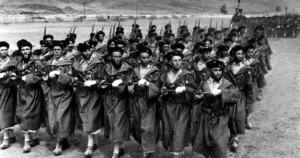
Moroccan Goumiers of the French foreign legion whose actions in Italy during WW2 shamed the force. Lekjaa follows their footsteps in African football.
We can only ask, as King Henry II of England reportedly did of Thomas Beckett, Archbishop of Canterbury in 1170, with regard to Ahmad, Lekjaa, Infantino and Samoura.
“Will no one rid us of this meddlesome quartet…?”

